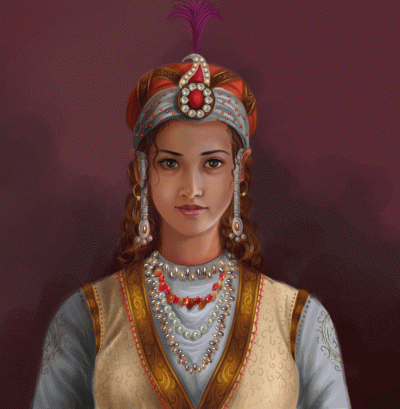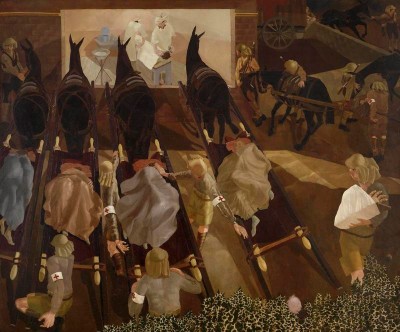Course description
Sultana Razia,
the First Woman Sultan and the First to be Chosen by her own People
Sultan Iltutmish, Razia’s father, was a not a spoilt son of a royal dynasty: he had worked his own way up from being a slave to becoming a king.
 Shamsuddin Iltutmish had, in fact, been sold into slavery as an infant and worked for many masters in Bukhara (in modern-day Uzbekistan) and Ghazni (a city in contemporary Afghanistan) before he was bought by Qutb Al-Din Aibak, the slave commander of Emperor Muiz Ad-Din, ruler of all the Ghurid lands in northern India. Although Iltutmish, already in his late teens, was now the slave of a slave, he was also always around the Emperor and so in a good position to advance his career and make the most of the opportunities given to him. He did not disappoint. Qutb Al-Din Aibak was pleased with his hard work and put him in charge of tax collection. He even came to the notice of the Emperor, when he showed great bravery and intelligence in 1205-6, fighting against the Khokhar rebels. In fact, Muiz Ad-Din gave Iltutmish his freedom even before he freed Qutb Al-Din Aibak.
Shamsuddin Iltutmish had, in fact, been sold into slavery as an infant and worked for many masters in Bukhara (in modern-day Uzbekistan) and Ghazni (a city in contemporary Afghanistan) before he was bought by Qutb Al-Din Aibak, the slave commander of Emperor Muiz Ad-Din, ruler of all the Ghurid lands in northern India. Although Iltutmish, already in his late teens, was now the slave of a slave, he was also always around the Emperor and so in a good position to advance his career and make the most of the opportunities given to him. He did not disappoint. Qutb Al-Din Aibak was pleased with his hard work and put him in charge of tax collection. He even came to the notice of the Emperor, when he showed great bravery and intelligence in 1205-6, fighting against the Khokhar rebels. In fact, Muiz Ad-Din gave Iltutmish his freedom even before he freed Qutb Al-Din Aibak.
 When the old emperor died, Qutb Al-Din Aibak battled another slave commander to take control of Muiz Ad-Din’s northern Indian lands but also stated that his loyalty was to Muiz Ad-Din’s eldest son and successor. Iltutmish served Aibak loyally for the four years he reigned before his unexpected death while taking part in a sports match. He never challenged him or left his service even though he was a free man. Clearly, Iltutmish was a man of his word. But he could not put up with the cruelty and poor administration of the man who came to the throne after Aibak, Aram Shah, defeating him in battle and taking the kingdom for his own. The land that he controlled was, to all intents and purposes, now Iltutmish’s own and he greatly expanded it into much of modern-day Afghanistan and Pakistan. His rule was fair and made his territory prosperous.
When the old emperor died, Qutb Al-Din Aibak battled another slave commander to take control of Muiz Ad-Din’s northern Indian lands but also stated that his loyalty was to Muiz Ad-Din’s eldest son and successor. Iltutmish served Aibak loyally for the four years he reigned before his unexpected death while taking part in a sports match. He never challenged him or left his service even though he was a free man. Clearly, Iltutmish was a man of his word. But he could not put up with the cruelty and poor administration of the man who came to the throne after Aibak, Aram Shah, defeating him in battle and taking the kingdom for his own. The land that he controlled was, to all intents and purposes, now Iltutmish’s own and he greatly expanded it into much of modern-day Afghanistan and Pakistan. His rule was fair and made his territory prosperous.
 So, when Iltutmish named Razia, his daughter (and probably his eldest child), he was not the sort of man to do this without careful thought. Sultana Razia’s father’s belief in her abilities and her service to the people of his empire was based on years of his own varied and long experience and on her own performance as his deputy when the old king was away from Delhi on a campaign to put down a revolt in Gwalior. Iltutmish’s opinion of his sons was that they were careless, fun-loving and unfit to take responsibility for his empire and his people. His opinion of Razia, though, was very different.
So, when Iltutmish named Razia, his daughter (and probably his eldest child), he was not the sort of man to do this without careful thought. Sultana Razia’s father’s belief in her abilities and her service to the people of his empire was based on years of his own varied and long experience and on her own performance as his deputy when the old king was away from Delhi on a campaign to put down a revolt in Gwalior. Iltutmish’s opinion of his sons was that they were careless, fun-loving and unfit to take responsibility for his empire and his people. His opinion of Razia, though, was very different.
However, there had never been a female ruler in Muslim territory before and it was a shocking decision for the old Emperor to name Razia as his successor. Many of his advisors – including his own wazir (or Prime Minister) – argued against it. Eventually, shortly before his death, Iltutmish changed his mind and appointed Ruknuddin Firoz, his drunken and party-loving son to take over after his death.
In fact, the old emperor’s worst fears became a reality and Ruknuddin spent his days riding around the markets of Delhi on his elephant, half-drunk, throwing gold coins into the crowd. He left the day-to-day business of government to his mother, Shah Turkan. Unfortunately, power had turned Iltutmish’s widow’s head and she no longer spoke or behaved wisely. Instead, she used her new position to get her revenge on all those people she believed had not treated her with enough respect when she was just one of Iltutmish’s wives – and one who was low-born as well! She blinded Iltutmish’s much-loved son, Qutubuddin, before murdering him, for example, and treated local governors without any respect. We also know that she planned for Razia to be executed.
 However, while Ruknuddin was away from Delhi on a military campaign, Razia addressed the people at a large mosque in Delhi after Friday prayer and criticized the Sultan and the power behind the throne, his mother. She made the people very angry and this allowed many governors and officials openly to rebel and support the population’s demand that Razia should rule the Empire. Shah Turkan was arrested. When her son returned to the capital, he was met by an army of rebels. We do not know whether he was killed in battle or murdered after he was taken prisoner but we are sure that Razia became the first Muslim woman ruler in South Asia.
However, while Ruknuddin was away from Delhi on a military campaign, Razia addressed the people at a large mosque in Delhi after Friday prayer and criticized the Sultan and the power behind the throne, his mother. She made the people very angry and this allowed many governors and officials openly to rebel and support the population’s demand that Razia should rule the Empire. Shah Turkan was arrested. When her son returned to the capital, he was met by an army of rebels. We do not know whether he was killed in battle or murdered after he was taken prisoner but we are sure that Razia became the first Muslim woman ruler in South Asia.
 Several senior officials and governors – all of Turkic origin – had supported Razia in her attempt to become the Sultan, but they had not realized that this was no ordinary woman! They expected her to remain in purdah, speaking to her ministers from behind a screen. Of course, she was not going to follow royal tradition and ride on an elephant through the marketplaces of her capital! She was a woman and could be easily controlled by her powerful advisors and generals. Sadly, they had mistaken her. Although, at first, Razia was invisible behind a heavy screen, she quickly had this removed and spoke directly, face to face, to them. Then, to their horror, she began to dress in men’s clothing and visit the markets and communicate directly with her people.
Several senior officials and governors – all of Turkic origin – had supported Razia in her attempt to become the Sultan, but they had not realized that this was no ordinary woman! They expected her to remain in purdah, speaking to her ministers from behind a screen. Of course, she was not going to follow royal tradition and ride on an elephant through the marketplaces of her capital! She was a woman and could be easily controlled by her powerful advisors and generals. Sadly, they had mistaken her. Although, at first, Razia was invisible behind a heavy screen, she quickly had this removed and spoke directly, face to face, to them. Then, to their horror, she began to dress in men’s clothing and visit the markets and communicate directly with her people.
Razia, realizing that her own Turkic advisors, governors and military men would never accept her as a real monarch with authority, started to put non-Turkic men in important positions. Her powerful supporters quickly left her and started to plot her overthrow. Some had already resented her because she had come to power on a wave of popular support from the people – not from themselves. Others were shocked by her lack of interest in typical female ways of behaving. They understood that she was not going to be a puppet they could control. She wanted to rule in her own right! They were angry, for example, that new coins did not have her father’s head on them, but her own.
 Razia was betrayed by her own senior officials and, although she married her main opponent, Altunia, in an effort to regain her throne, they were defeated in battle by her half-brother, Muizuddin Bahram, on 14th October, 1240. Altunia and Razia escaped but were killed the next day when they were caught on their way east.
Razia was betrayed by her own senior officials and, although she married her main opponent, Altunia, in an effort to regain her throne, they were defeated in battle by her half-brother, Muizuddin Bahram, on 14th October, 1240. Altunia and Razia escaped but were killed the next day when they were caught on their way east.
Muizuddin became Sultan after Razia’s death and built a tomb for her in Delhi, which was visited by many Sufi and other Muslim devotees. It is still there today, although sadly neglected.
We cannot know whether Sultana Razia would have been a great ruler or a cruel or weak one. She spent most of her three-and-a-half year reign fighting invading armies and rebels. She never had a chance to prove herself…. And all because she was a woman who wanted to rule as she thought best. Nobody, of course, would allow her to do that.
If you want to watch some videos on this topic, you can click on the links to YouTube videos below.
If you want to answer questions on this article to test how much you understand, you can click on the green box: Finished Reading?
Videos:
1. Sultan Iltutmish (6:02)
2. Razia Sultan: The First and The Last Woman Ruler of Delhi Sultanate (4:52)
3. Sultana Razia”s kingdom and ruling policies (24:00)
4. Sultana Razia’s reign (9:00)
5. Razia Sultana Tomb in Delhi (2:45)

 Shamsuddin Iltutmish had, in fact, been sold into slavery as an
Shamsuddin Iltutmish had, in fact, been sold into slavery as an When the old emperor died, Qutb Al-Din Aibak
When the old emperor died, Qutb Al-Din Aibak  So, when Iltutmish named Razia, his daughter (and probably his eldest child), he was not the sort of man to do this without careful thought. Sultana Razia’s father’s belief in her abilities and her service to the people of his empire was based on years of his own
So, when Iltutmish named Razia, his daughter (and probably his eldest child), he was not the sort of man to do this without careful thought. Sultana Razia’s father’s belief in her abilities and her service to the people of his empire was based on years of his own However, while Ruknuddin was away from Delhi on a military
However, while Ruknuddin was away from Delhi on a military  Several senior officials and governors – all of Turkic origin – had supported Razia in her attempt to become the Sultan, but they had not realized that this was no ordinary woman! They expected her to remain in purdah, speaking to her ministers from behind a screen. Of course, she was not going to follow royal tradition and ride on an elephant through the marketplaces of her capital! She was a woman and could be easily controlled by her powerful advisors and generals. Sadly, they had mistaken her. Although, at first, Razia was invisible behind a heavy screen, she quickly had this removed and spoke directly, face to face, to them. Then, to their horror, she began to dress in men’s clothing and visit the markets and communicate directly with her people.
Several senior officials and governors – all of Turkic origin – had supported Razia in her attempt to become the Sultan, but they had not realized that this was no ordinary woman! They expected her to remain in purdah, speaking to her ministers from behind a screen. Of course, she was not going to follow royal tradition and ride on an elephant through the marketplaces of her capital! She was a woman and could be easily controlled by her powerful advisors and generals. Sadly, they had mistaken her. Although, at first, Razia was invisible behind a heavy screen, she quickly had this removed and spoke directly, face to face, to them. Then, to their horror, she began to dress in men’s clothing and visit the markets and communicate directly with her people. Razia was
Razia was 
















